By: Dylan Drukmaler and Judy Zhang
As the national average for a gallon of normal gasoline has seen dramatic price swings over the last several years, volatile gas prices have taken centre stage in the media. Natural gas prices in many countries have witnessed an all-time high while international wholesale gas prices have risen 250% since the beginning of the year. Varying factors, such as low supply, natural disasters, economic recovery, and the Russia-Saudi Arabia oil price war have been at play in the soaring of prices. The on-going spike in energy prices has begun to create a dent in the ongoing economic recovery from COVID-19 for several reasons.
Implications for Consumers:
An important economic implication to consider in the context of rising gas prices is the effect it has on the average consumer. Consumers are already struggling to stay on their feet due to the COVID-19 pandemic, and the continuous dread of gas prices only worsens that. On a very basic level, when gas prices are high, the average consumer must pay more at the pump. This decreases their discretionary income, which in turn, negatively impacts the economy as there is less money being spent on discretionary items and more money spent on gas. With that being said, consumers are even less motivated to purchase discretionary items due to the inevitable raised prices from the spike in gas prices. Retailers rely on strong margins for success, which results in passing on new costs to the consumer. In this case the increased cost of transportation will be passed to the consumer.
Implication for the Economy
Additionally, job growth is closely monitored as a sign of the economy's recovery. Rising gas costs may have a detrimental influence on hiring patterns during an economic rebound. Rising gas costs may push some firms to reconsider their employment plans, which they have been deferring because of concerns about the economy's health. Reduced discretionary expenditure leads to lower sales, which might affect a company's capacity to hire.
Implications for Governments:
Increased gas prices and energy bills for consumers have also resulted in the growth of macroeconomic headwinds. Skyrocketing prices have left consumers wary of the elevated inflation and interest rates that will follow. Canadian inflation rates reached 4.1% in August while Europe’s rate of 3.4% significantly surpassed the expected rate of 2%.
Certain governments have suggested plans on bailing out companies that have been put under strain by distributing state-backed loans and underwriting supplier debt. For example, companies within the food industry have been faced with shortages in carbon dioxide and fertilizers. CF Industries, a large North American manufacturer of agricultural fertilizers, has halted two of its U.K. plants due to the rapid increase in energy prices. Similar companies within the food industry who have seen distributions within their supply chain have requested for government aid.
Furthermore, consumers have been pushing for governments to regulate price caps and cut energy taxes. Countries, such as the UK, have seen energy price caps grow, with many fearing that the government will once again raise the ceiling during their semi-annual review. On August 6, 2021, Ofgem, the energy regulating organization for the UK, announced a 139 pound increase in their price cap, bringing the ceiling to 1277 pounds. While governments have considered increasing relief programs for low-income families, government policies can have a rippling effect on the economy and must be carefully implemented to balance the needs of consumers and corporations.
With the economy heading back to its pre-pandemic state, it is inevitable the world will face increased prices due to unstable supply-demand levels. With the global energy sector facing its highest growth in price in decades, consumers and companies alike have been placed under significant strain, due to a decrease in discretionary income and employment levels. This has called for governments to intervene and moderate impacts through government policies and relief funds. Nonetheless, it is expected that prices will continue to grow as a natural consequence of the reopening of the economy.

